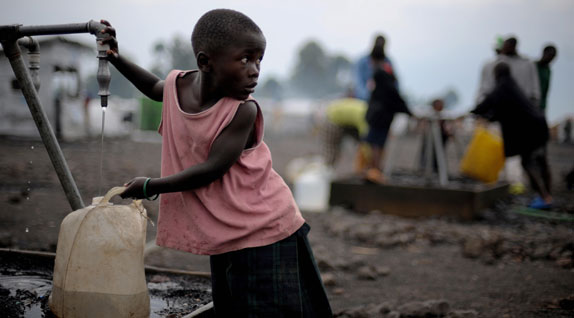 Roberto Schmidt/AFP/Getty Images
Roberto Schmidt/AFP/Getty Images
Article
Despite its immense potential, Africa is drowning in seemingly insurmountable problems. Is there a solution?
Learn the why behind the headlines.
Subscribe to the Real Truth for FREE news and analysis.
Subscribe NowAfrica is fabulously rich in natural resources, more than any other continent. According to Capitalism Magazine, it has 50 percent of the world’s gold and diamonds. It possesses a seemingly endless supply of minerals, including most of the world’s bauxite, chromium, cobalt, manganese and platinum, along with large untapped oil reserves. It has an abundance of timber, millions of acres of fertile land, and lakes and rivers capable of producing 40 percent of the world’s supply of hydroelectric power. The list could go on.
Simply put, Africa is a treasure trove of natural resources.
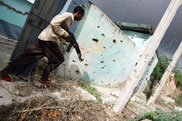 Mohamed Dahir/AFP/Getty Images
Mohamed Dahir/AFP/Getty Images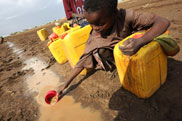 Mohamed Dahir/AFP/Getty Images
Mohamed Dahir/AFP/Getty ImagesYet, despite these riches, most Africans live in societies troubled by war, instability, corruption, poverty, hunger, disease and untimely deaths. The United Nations said that Africa has the largest number of poor countries of any continent, including 34 of the 50 least developed countries. Tragically, as many as 50 percent of Africans live on less than $1.25 a day (USD throughout article).
Wars ravage the continent. Since 1981, no fewer than 28 nations in sub-Saharan Africa have been at war.
Deadly diseases like AIDS and malaria wreak havoc throughout nations.
The world’s wealthiest countries have provided billions of dollars in aid, but to no avail. Indeed, Africa is poorer now than when it first achieved independence from the colonial powers some 50 years ago. Every year, the continent is high on the list of the world’s priorities for development, but its circumstances continue to deteriorate.
As the international community ponders the plight of this troubled continent, the question must be asked: “Can Africa be saved?”
Why Africa Matters
Africa is the earth’s second-largest continent; a vast expanse stretching some 5,000 miles (8,000 km) between its most northern and southern tips, and 4,500 miles (7,000 km) between its most eastern and western points. With a population of approximately 1 billion, it is also the world’s second most populous continent, accounting for 15 percent of the global population. It encompasses numerous ethnic groups in 53 countries, speaking over 1,000 languages.
The continent also leads the world in strategic minerals (rare minerals absolutely vital for industry), possessing 80 percent of the world’s platinum, 49 percent of its palladium, 55 percent of its chromium and 45 percent of its vanadium, among others.
Its fertile fields have the potential to feed not only itself, but also many other countries. Its forests have enough timber to build homes for much of the world. Moreover, Africa’s massive rainforests have the potential for maintaining or destroying the equilibrium of the earth’s atmosphere and ecology. For example, massive deforestation could deplete the world’s ozone layer and adversely affect Earth’s climates.
If the continent’s economic decline can be reversed, a prosperous, vibrant Africa, with its population of 1 billion, would become a huge market of consumers for products and services. A talented, educated populace would provide a skilled workforce, driving African economies capable of competing on the world stage, thus reducing—and possibly even eliminating—the need for aid.
Africa already contributes internationally in many fields of human endeavor—and its contributions would be even more significant if the potential of its peoples and lands were fully unlocked. All nations would benefit.
A Beautiful Continent, a Litany of Problems
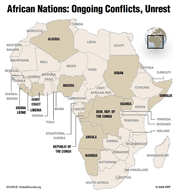
Those who travel to Africa are enraptured by its beauty. From majestic Mount Kilimanjaro, to the exotic savannahs of the Serengeti, to the giant Great Rift Valley, to beautiful Lake Victoria, to the mighty Nile River, to the imposing pyramids, to the beauty of Table Mountain, Africa leaves an indelible mark on many a visitor.
It is simply a unique continent. It has both the world’s longest river and largest desert. Scores of animals not typically found elsewhere abound in Africa: zebras, gazelles, rhinoceroses, magnificent giraffes, impressive cheetahs and mighty hippopotamuses, to name a few. Rainforests containing an immense array of flora and fauna straddle the equator. Africa’s wildlife is stunning.
But the beauty of the continent also lies in its people. Africans—a kaleidoscope of races and ethnicities of seemingly every shade under the sun—are some of the most friendly, generous and easy-going people on Earth.
Many envision images of Africa with only grinding poverty. However, according to the Washington Post, perhaps as many as one third fall into the middle income category. Like anywhere else, Africa has its share of nice neighborhoods. The view of the entire continent as being desperately poor is simply incorrect.
Still, Africa does face tremendous problems that have stifled its development.
Poor Leadership
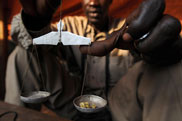 Lionel Healing/AFP/Getty Images
Lionel Healing/AFP/Getty Images Issouf Sanogo/AFP/Getty Images
Issouf Sanogo/AFP/Getty Images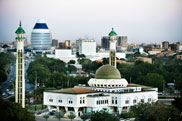 Marco Di Lauro/AFP/Getty Images
Marco Di Lauro/AFP/Getty ImagesLack of true leadership is a reoccurring theme in many African countries. Since achieving independence, corruption, instability and violence have hampered the development of former European colonies. Dictators arose, oftentimes poorly educated military leaders. Instead of serving the people, they served themselves and their cronies. Some deliberately fanned the flames of ethnic rivalry, marginalizing other ethnic groups, and applying a “divide and conquer” approach to leadership. Some dictators amassed billions of dollars in personal fortunes as they allowed their citizens to starve to death. Others favored those of their ethnic group above others, establishing virtually one-man states, killing or imprisoning the opposition, and fueling wars and conflicts.
To say that Africans have been underserved by their leaders is an understatement! Incompetence and lack of vision is prevalent: “Where there is no vision, the people perish: but he that keeps the law, happy is he” (Prov. 29:18).
Men have established governments based on their own ideas of right and wrong, primarily to benefit themselves. They ignore the Law of God, which is a lamp of understanding to any who keeps it (Psa. 119:105).
However, “The prince that wants [lacks] understanding is also a great oppressor” (Prov. 28:16). Certainly, this verse describes Africa’s brutal dictators, whose greed has been fueled by their own covetousness. On the other hand, “he that hates covetousness shall prolong his days” (same verse).
Africa has had many leaders who ruled for decades, yet their people remained poor. With few exceptions, its leadership has been weak, ineffective, oppressive, incompetent, corrupt and downright inefficient.
The strength of any society depends on the quality of its leadership. If Africa is to recover, it must have leaders who can, and are willing to, properly guide the way.
Widespread Corruption
From top to bottom, corruption permeates many African societies. Graft, nepotism, discrimination, bribery and outright thievery are prevalent in far too many nations. According to Transparency International, in 2008 seven of the 10 most corrupt nations in the world were African.
Corruption manifests itself in numerous ways (often blatantly) in government, industry, politics, and even in obtaining basic services. Sadly, to get important matters accomplished, individuals often face the prospect of paying bribes.
For Africa to have any chance of improving, honesty and integrity must become ingrained in its societies.
Poverty
The UN Human Development Report for 2003 revealed that the bottom 25 countries were African. Shockingly, 80 percent of Africa’s people live on less than $2.50 per day. The average poor person in sub-Saharan Africa lives on just 70 cents per day.
Adjusting for inflation, the average person was poorer in 2003 than he was in 1973! In addition, the number of impoverished has almost doubled over the past 30 years, from 200 million to 380 million, according to the World Bank.
Along with poverty, illiteracy abounds—60 percent of adults in sub-Saharan Africa are illiterate, and 40 percent of children in sub-Saharan Africa are not in school.
Unless poverty and illiteracy are resolved, Africa will be unable to tap the full potential of its citizens.
Underdevelopment
Throughout Africa, infrastructure remains a problem: 36 percent of households in sub-Saharan Africa are without an improved water source; 73 percent are without improved sanitation; only five percent have a telephone; and 37 percent are without electricity (Africa Infrastructure Country Diagnostic). Africa’s Sub-Saharan 48 countries (pop. 800 million) generate roughly only as much power as Spain (pop. 45 million).
The continent suffers from impassible roads and broken-down railway networks. Basic services such as electricity are unreliable. A satellite image of Africa at night reveals a continent in darkness, the result of a lack of electricity. Its agriculture is largely dependent on primitive technology and, therefore, highly depends on rainfall. Irrigation is seldom used: When it rains, crops are plentiful; when it does not, there is famine.
Scarce resources are often used for military purposes instead of benefiting the continent’s development needs, which could be channeled into schools, roads, hospitals, irrigation facilities, telecommunications, roads, and other areas vital for Africa’s development.
For trade, industry and agriculture to reach their potential, Africa’s infrastructure must be drastically improved.
Disease
Disease stalks the continent: poor sanitation, inadequate water supply, malnutrition, and ill-health afflict many people. More than 250 million do not have access to clean water, and more than 200 million do not have access to health services.
AIDS threatens the very foundation of African nations, with 15.5 million people having died from health-related complications since 1981; at least 25 million were HIV positive in 2007 (WHO/UNAIDS). Sub-Saharan Africa has an astonishing 70 percent of global infections. At least 95 percent of AIDS orphans are African (UN Food and Agriculture Organization). A 2008 UNAIDS report revealed that more than 11 million children have lost their parents to AIDS. Average life expectancy is 47 years in sub-Saharan Africa; just without AIDS, it would be 62.
Malaria is another major killer. Some 3,000 children die from it daily. Tuberculosis is also significant, along with Ebola and other deadly diseases.
Raging Conflicts
Africa faces severe and mounting problems that are not easily solved. One of the greatest is war. Presently, 15 countries are either engaged in war or are experiencing post-war conflict and tension, be it civil or external. Africa, in recent times, has been wounded by the scourge of war perhaps like no other continent. Here are just five:
• Democratic Republic of the Congo: During the past decade, this massive country has been gridlocked in a brutal civil war. At times, up to seven nations have been directly involved in this conflict for control of the country’s vast mineral reserves. Since 1998, over 5 million people have died, the highest loss of life in conflict since World War II. To put this in perspective, its death toll is up to one thousand times greater than the more widely reported Israeli-Palestinian conflict.
A peace agreement was signed in 2003, reducing the war’s intensity. Nonetheless, skirmishes still flare up with significant loss of life.
• Sudan: A bitter war continues between the Sudanese government and rebels in the Darfur region. Rebels took up arms after allegations of decades-long neglect and abuse. Government forces retaliated swiftly. Accurate details of the death toll are hard to come by, but the UN estimates that over 200,000 have been killed and millions displaced. Despite UN intervention, the war rages on, creating a humanitarian disaster, with refugees flooding into Chad and other neighboring countries.
• Somalia: The country collapsed into anarchy with the ousting of long-time ruler General Mohamed Siad Barre in 1991. A U.S.-led intervention to restore order was unsuccessful. In 2006, Islamic militants briefly seized power, but were defeated by Ethiopia. Since then, Somalia has been in a state of lawlessness.
• Liberia: This once peaceful country, created by freed American slaves in the 19th century, was rocked by civil wars in 1989 and 1999. The war came to an end in 2003 with the resignation of Liberian ruler Charles Taylor. After several years of upheaval, peace was finally restored, and the nation is moving forward under the leadership of its first female prime minister.
• Sierra Leone: In the 1990s, rebels fought the government for control of the country’s diamond resources. The rebels were notorious for recruiting child soldiers. Human Rights Watch estimates that over 50,000 people have been killed and 1 million displaced. Since then, Sierra Leone has started the long road to recovery.
The specter of war has never been too far from Africa. Other nations that have been recently ravaged by war include Rwanda, Angola, Mozambique, Ivory Coast and Uganda, among others. Even in nations now at peace, various ethnic groups eye one another with suspicion in an uneasy truce. Since the end of the Cold War, more than 9 million have died due to civil unrest in Africa. War has also led to over 9 million refuges and internally displaced people.
Africa’s natural resources have so far proved to be a curse rather than a blessing.
Africa Will Be Saved!
Addressing Africa’s plight has been on the agenda of the United Nations, the World Bank, the International Monetary Fund and the world’s richest countries for decades, which have often described the continent’s development as a top priority.
Aid has been poured into projects and industry in the region to improve the standard of living. Over the last 40 years, more than $2.6 trillion has been provided to developing countries, of which 25 percent has gone to Africa, totaling a staggering $500 billion. Some of these initiatives have achieved a measure of success. But overall, Africa continues to wallow in war, poverty, hunger, disease and death.
For decades, Africans have tried to solve their continent’s problems. For decades, the world has been trying to solve Africa’s problems. Yet to no avail.
Why? Why have billions of dollars and good intentions been unable to lift Africa out of its myriad of problems? Is there something that has been overlooked?
The reasons behind Africa’s problems are fundamentally spiritual in nature, not physical. War, oppression and corruption are rife in Africa, the major factors that stifle development. The motivating factors behind these are hatred, envy, malice, jealousy, lust and greed. When these are prevalent, they lead to the downfall of any nation or continent: “Righteousness [keeping God’s Commandments – Psa. 119:172] exalts a nation: but sin is a reproach to any people” (Prov. 14:34).
Until these things are removed, Africa’s problems will not be solved. Throwing money at them will not work if the underlying causes are ignored.
The good news is that there is a new world-ruling government coming soon. With this government, wars, corruption and oppression will be removed. True leadership will come to Africa. Under the government of God, the laws of God will be enforced. It will not be a government by the people, but for the good of the people (Isa. 11:1-5).
War, oppression and corruption will be removed. Everyone will speak the truth with his fellowman, and will work for the benefit of all. People will learn to love—have outgoing concern—for each other. There will be no place for graft, nepotism, cronyism, discrimination, lying or any other form of corruption.
At that time, with the government of God in place, Africa will become a prosperous, vibrant continent, a place of joy, where every African—along with all peoples—will realize his or her full potential!
(If you would like to know more about this topic read our free booklet Why Man Cannot Solve His Problems.)
More on Related Topics:
- In a Nigerian Village, Extremists Issued a Call to Prayer and Then Slaughtered Those Who Turned Up
- Sudanese Paramilitary Force Abducting Children in Darfur, Witnesses Say
- Nigeria’s Northeast Faces Worst Hunger in a Decade as Aid Cuts Hit Region, UN Says
- Uganda Shuts Down Internet Ahead of Election, Orders Rights Groups to Halt Work
- Sudan’s Top General Rejects U.S.-Led Ceasefire Proposal, Calling It ‘The Worst Yet’



